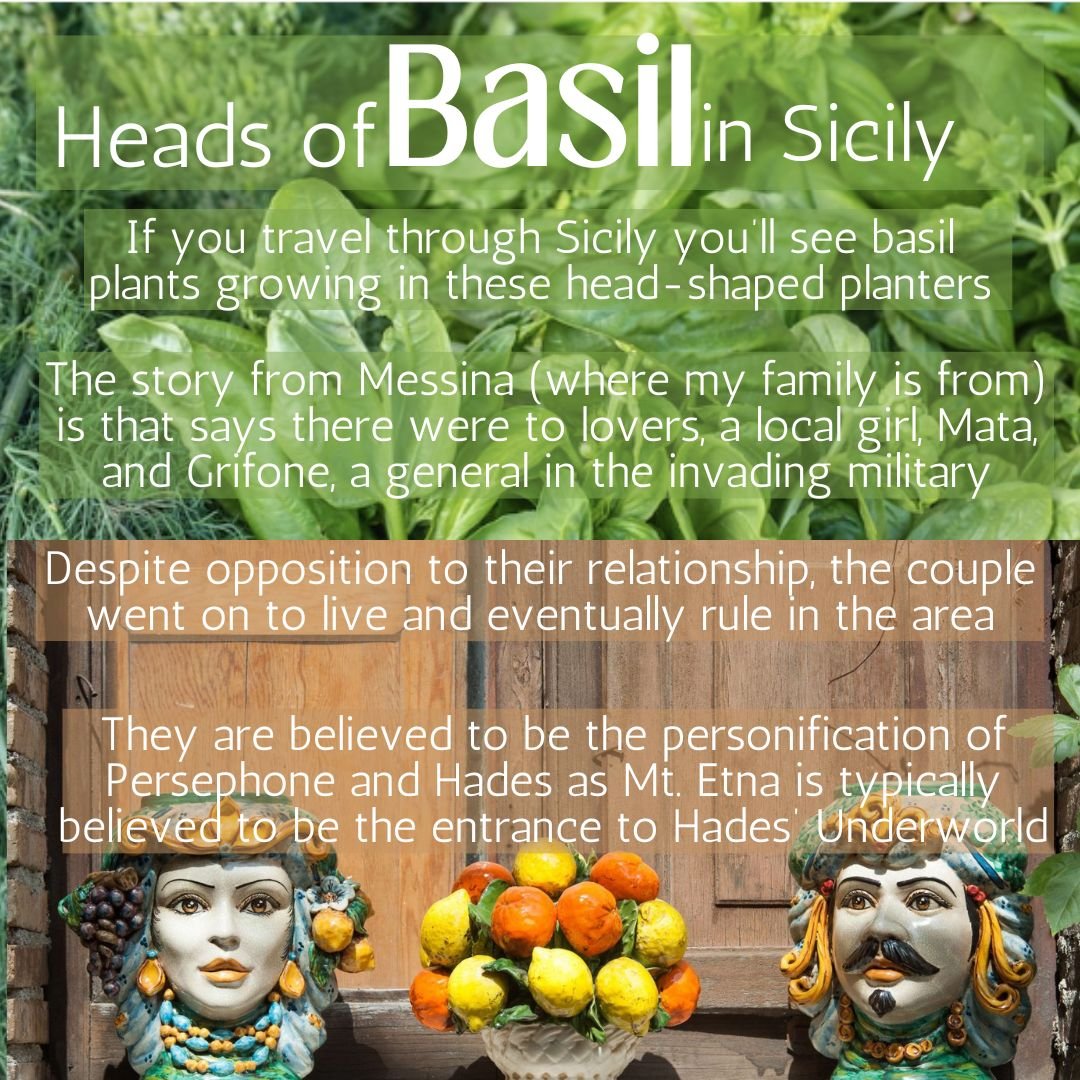
Basil
Basil felt like the perfect herb to close out the last warmth of summer. We eat it all summer long in salads and pastas, but it is also a great herb to transition us into the cold winter months. Basil is a great herb for fighting cold and flu symptoms, and it also is known for bridging the gap between life and death – making it an excellent option to honor those who have passed in celebration for Halloween
-

Basil - October Herb of the Month
Basil is the October Herb of the Month. It is another member of the Lamiaceae (Mint) Family
-

Name and Nativity
Ocimum basilicum is the Latin name for Basil, it comes from the words for fragrant and kingly and was known as the Herb of Kings by Greeks. Basil varieties are native to many parts of the world, primarily Eurasia and northern Africa, but some are native South America. Sweet Basil is believed to come from India.
-

Basil Identification
Basil has square stems and opposite leaves (common for members of the mint family). Their glossy, oval shaped leaves can be dark green or a lighter shade, they have smooth or slightly toothed edges. Basil has small white/pink flowers in terminal clusters (tall sticks of small flowers). It has a distinct licorice/peppery scent and taste and warming energetics.
-

History of Basil
Our earliest known medicinal references of Sweet Basil come from Indian Vedic texts written over 5,000 years ago. Through human cultivation Basil now grows throughout the world in warm zones. Basil is typically found in two varieties, Sweet Basil (or Genovese) is what we think of in Italian cooking, and Thai Basils (like Holy Basil/Tulsi) we find more in many Asian cuisines.
-

Heads of Basil in Sicily
If you travel through Sicily you’ll see basil plants growing in these head-shaped planters. The story from Messina (where my family is from) is that says there were to lovers, a local girl, Mata, and Grifone, a general in the invading military. Despite opposition to their relationship, the couple supposedly went on to live and eventually rule in the area. Mata and Grifone are believed to be the personification of Persephone and Hades as Mt. Etna is typically believed to be the entrance to Hades’ Underworld.
Photo Credit: Marco Ossino @AnticoSoleItaly
-

Heads of Basil continued
A more gruesome version of the story comes out of Palermo where a North African merchant wooed a local woman and they started a relationship. After finding out he had a wife and children at home the woman slept with him one last time, chopped his head off, scooped out his brains and planted basil in it . Her tears watered the basil and fueled with her passion it grew and flourished bigger than any others. Neighbors made similar planters out of ceramic in the hopes theirs would grow like hers.
-

History of Basil in India
Holy Basil (Tulsi) is considered a sacred plant in India. Hindus believe it to be the personification of the goddess Tulasi and it is often used in the worship of Vishnu and Krishna. Traditionally people would put their hand on Basil to swear in court, this was considered an acceptable substitute to swearing on a religious book during British occupation.
-

Basil Medicinal Uses
Basil has both cooling and warming energetics. It is very safe to ingest, but there are cautions to not eat in excess while pregnant or trying to conceive. Basil contains tons of terpenes including - Cadinene, Caryophyllene, Eucalyptol, Eugenol, Fenchone, Humulene, Limonene, Myrcene, Ocimene, Pinene, and Terpinolene.
-

Holy Basil - the medicinal star
Holy Basil (or Tulsi) is one of the most revered and respected medicinal herbs worldwide. It is very good at balancing and normalizing both blood sugar and blood pressure levels in the body. Tulsi is possibly best known as an adaptogenic herb meaning it is excellent for daily use, works with other herbs to help them work more effectively, and provides good nourishment towards a balanced health.
-

Other Medicinal Uses
Basil is very good at reducing the impact that stress and anxiety have on the body. It’s useful as a stimulant to help with congestion and cold and flu symptoms. Basil is also great as a digestive aid, helps you sleep better, and fights off illness as an anti-viral and anti-microbial.
-

Basil Spiritual Associations
Basil has masculine energy and is ruled by the planet Mars. It has associations with both Scorpio and Aries. Basil is believed to be a bridge between life and death. It can aid in communication and calming tense situations. It protects against negativity or attracts what positivity you want to bring in whether it is love, abundance, customers, or good fortune.
-

Beliefs about Basil
In India, basil is buried with the dead and helps them get into heaven. It is also be used to ward off evil. Jewish folklore shows basil used to add strength when fasting. Basil is an important herb in the Greek Orthodox Church, and is often found in Holy Water for its protective qualities. In Mexico, basil is planted or hung in businesses to bring in success.
-

Basil Mythology
Greek Mythology tells of a warrior Ocimus who was killed by a gladiator and had basil (the ‘kingly’ herb) spring up around him. In Europe during the Middle Ages it was believed that smelling Basil produced spontaneous generation of scorpians and eating it could make them sprout in your brain. Ancient Romans believed eating basil was the antidote to a Basilisk bite.
-

Basil Rituals
Basil can protect from negative energy, or attract positive energy based on how it’s used. Grow basil outside your home to bring protection and ward of evil. Carry a basil leaf in your wallet to attract money. Brew basil in tea or add it to a meal before a tense conversation.

